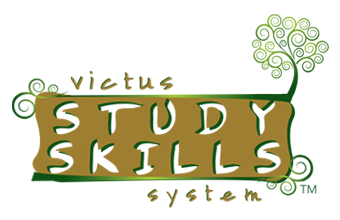From the desk of Susan Ison, President
A guest article by Victus Instructor Brooke Ballenger
How well is your student swimming in the waters of study?
Let’s imagine a new swimmer who gets into the water and paddles, struggling to stay afloat. He does not yet have knowledge of proper swimming techniques, and he becomes frantic when he realizes that his best efforts hardly keep him above the water. He tries hard, but the result is exhaustion and discouragement. He is happy just to make it out of the pool without sinking.
Studying can be a bit like swimming. A student with little knowledge of proper study techniques tries hard to complete her homework, but she struggles not to fall behind because she does not possess the time management skills to keep up. She’s not sure how to remember all those vocabulary words or the facts from the textbook. When the first nine-week exam looms, she feels frantic with test anxiety and stays up late to prepare. Exhausted and discouraged, she prays that she will at least get a C.
When our students fall behind in school, the response often is to remove privileges or to tell our students to increase their study time. Parents or teachers may say, “You can do better if you’ll just try harder!” But no matter how hard the swimmer or the student tries, the results will be fruitless if they do not have the knowledge they need to perform the task.
In study, there is a process that students can follow…
Zeal without knowledge is not good, but zeal with knowledge bears fruit. In study, there is a process that students can follow to help them succeed in all areas, from time management and project planning to reading comprehension and test preparation. Does your student have the knowledge that he or she needs to succeed in these areas of study?
Let’s return to our swimmer who has been struggling. He now has a coach who instructs him to lie flat in the water and put his face down. Hesitant at first, he tries again with this new knowledge and realizes that he does not have to struggle to stay afloat. He practices this process until it becomes a habit, and soon he is able to glide almost effortlessly through the water.
Results come from the process.
W. Edwards Deming, a quality expert and statistician known worldwide, taught that the results of anything we do come from the process, or the steps that we take. He taught that in order to improve results, we must improve the process. Our swimmer improved his process with proper training. A coach with experience in the process of swimming showed him how to swim properly and made sure he followed the steps. He watched the swimmer so he could give him feedback on his technique, and he gave him further instruction as needed.
Results come from the process. There is a series of steps that we undertake for each thing we do. From the seemingly mundane things like turning on a light to the more important things like raising our children, we each have processes we follow.
Do you believe that the process your student uses to study is directly proportional to the quality of his or her results? As the time for progress reports draws near in many schools, now is a good time to sit down with your student and talk about the process of study. Ask your student how he plans for projects and papers, and what his process is for remembering vocabulary and facts from textbooks.
Encourage your students to think about the steps they take for each of these tasks, and talk about specific methods they can use to improve their process. Just as our swimmer needed a coach with more experience, so our students need adults in their lives to train them in the process of study. They need timely feedback to assess the quality and effectiveness of their process.
Study is like any other skill that we improve with coaching and practice.
A student we had tutored was struggling in spelling. His tutor asked him to try some different steps to learn the words, and soon the student was spelling all the words correctly. When asked what he had done differently, he said he closed his eyes after looking at the words and visualized them. With the help of a coach, this student had assessed his former process and changed the steps of his process for better results.
Study is like any other skill that we improve with coaching and practice. Which study skills can your student improve upon for better results?

